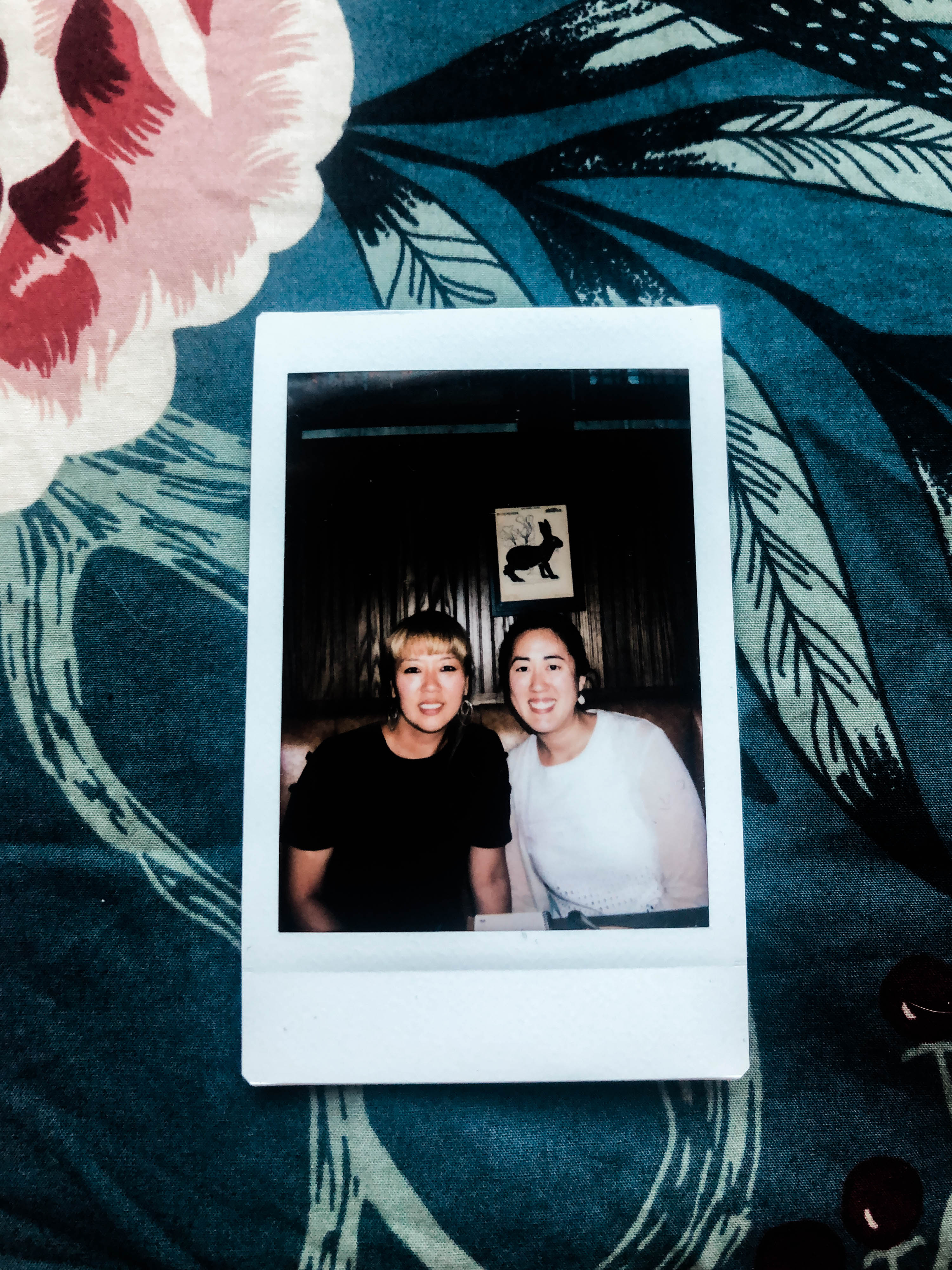Food for Thought is a new interview series that connects “mid-career experts” with “emerging professionals” — while keeping those classifications purposefully vague — over food, drinks, coffee (or whatever) in an effort to welcome voices that haven’t yet been heard on issues that matter the most. No facades of mentorship or shallow professional development advice… just the conversations people are passionate about. Food for Thought will span organizations, political beliefs, age groups, and dining establishments to spark ideas and make connections integral to the cohesion of the national security community.
“Food may not be the answer to world peace, but it’s a start.” — Anthony Bourdain
Perhaps my favorite part about Washington DC’s Chinatown is drinking whiskey underneath it.
While Chinatown in DC doesn’t feel like an alley in Chengdu quite the way New York City’s Chinatown does, it is uniquely vibrant. A mosaic of people hustling to and from the Capitol One Arena, gawking tourists, impromptu rap performances, all under a brightly painted paifang and an occasional cloud of marijuana smoke. As eclectic as the neighborhood it’s located in, the Crimson Whiskey Bar resides underneath the Pod Hotel.
“You going upstairs?” the giant man eying my ID at the door asked when I first got there, referring to the rooftop bar that affords you views of the DC skyline accompanied by a soundtrack of every consultant in the city making menial small talk. When I responded I was actually going downstairs he chuckled with a, “Really?! Could have fooled me.”
Jenny Town walked into our meeting to “Get Your Freak On” by Missy Elliot, and I could not have planned it better if I tried. A giant in the Korea policy field, Town is someone who can drink all of the men in the room under the table and eloquently explain the nuances of East Asian geopolitics with equal levels of fiery nonchalance. Her persona screams “badass.” On top of being named one of Fast Company’s Most Creative People in Business, Town is a fellow at the Stimson Center and the Managing Editor of the Center’s 38 North publication, a website devoted to providing policy and technical analysis on North Korea.
“Do we want to get a cheese board?,” I asked. Town immediately answered with a “Fuck yeah.”
While the Crimson does some “bites,” the main attraction is the whiskey. With over 150 different types of whiskey, the Edison light bulb lit cave’s main design feature is the bottles themselves, sprinkled with a few quirky taxidermy animals here and there.
“This place can get pretty wild,” Esther Im told me, as she casually sipped her beer. Im is a Program Officer at the National Committee on North Korea (NCNK). Previously, she worked as a Junior Fulbright Researcher in South Korea and as a Researcher at the Permanent Mission of the Republic of Korea to the United Nations. Albeit a bit more reserved than Town, the passion Im has for her work is palpable.
Just as we were getting ready to begin the interview, North Korea launched projectiles for seventh time in just one month.
“Ugh, North Korea is launching missiles again,” Im informed us in between bites of loaded tater tots.
“Are you surprised?” Town laughed. Im sighed heavily and responded with a resigned, “I guess not.”
THE INTERVIEW
Q: What trends in North Korean analysis do you see emerging? What concerns you?
Im: “Right now, I’m frustrated with the public discourse on North Korea. For example, I went to grad school during the time of “fire and fury,” with classmates who were well educated, interested in foreign policy, and were aspiring to go into policy fields, and yet the common discussions on North Korea were about how North Korea can’t be trusted, North Korea is cheating all of the time, and how negotiations with North Korea will never work. There is this lack of a nuanced understanding of diplomatic history and a context-less approach to understanding the country and the conflict. That is not to say, however, that North Korea hasn’t ever cheated. It has earned its reputation. But, to approach, or analyze, the issue with so much defeatism, doesn’t allow for a North Korea that can change its strategic calculus. When we think of North Korea, we think of it in these caricatures and monoliths that may or may not be true today.”
Town: “I think too often there is a tendency to view this issue in the context of big power competition and discount North Korean agency in the process. There is widespread belief that because of North Korea’s political and social structure, that its strategic thinking is frozen in time: what Kim Il Sung wanted was the same under Kim Jong Il and is the same now under Kim Jong Un despite how the world has evolved around them. Well, this is simply not true. Yes, there are some similar motivations among the three, but the regime’s strategy and policies do evolve as the country’s geopolitical and socioeconomic realities change—although in some areas that change is more agile than others. But thinking of North Korea in these kind of static terms leads to a lot of miscalculated approaches and policies.
Another problem is that there is a tendency to approach this issue in a linear path, or a straight line: we’ve negotiated with North Korea for 25 years and now they have a nuclear weapons program, so negotiations don’t work. The problem with this narrative is that we haven’t had a sustained negotiation over the past 25 years. We’ve had several attempts, some of which were more successful than others. But even when we were successful in reaching an agreement, there were often problems during the implementation of those agreements that rather than working through them, one side or the other unilaterally walked away. Once you set that precedent, credibility plays a huge factor when trying again. On some level, think of it like a Rubik’s cube, it’s definitely solvable but not everyone can figure it out. Sometimes you can even get close – with several sides solved but a few squares still out of place. But the pattern of how you play with the cube is that you try really hard the first time, are sure you’re one of the smart ones that can figure it out, and you may get close, but eventually get discouraged and walk away. The next time you try, you have less patience for it, and walk away sooner; and each subsequent time, the amount of effort you’re willing to spend trying to solve it wanes. Then you have people who cheat – peel the stickers off and arrange them to look like you’ve solved the problem. That’s essentially where we are now – Trump is taking that shortcut and trying to engineer a win. However, anyone who’s done that, myself included, knows that once you’ve pulled that sticker off, it doesn’t have the same stickiness and will eventually fall off, at which point, you don’t even know where it was supposed to be. That’s really what it feels like now – we’re at a loss now of how to get back on track.
Im: “Going off of that Rubik’s Cube analogy, it’s so frustrating to approach the situation in absolute terms. Even if you only get one side of the Rubik’s Cube… that should be appreciated! If a 100 percent American style democracy in North Korea as an outcome is the measure of successful diplomacy with North Korea, then it is game over already. We also underestimate the efforts we’ve made to date and overlook all of the small steps of progress, and miss opportunities for paths forward because we have only focused on the big picture… And advocating for an incremental approach doesn’t make you pro-North Korea.”
Town: “The patience to actually negotiate and realistic thinking about how to approach diplomacy often just isn’t there.”
Q: What’s one thing Americans consistently get wrong about North Korea?
Im: “There’s this inclination to think that North Korea operates in exactly the same way Americans do. We tend to ignore that North Korea’s political system is different, and that there are different cultural nuances. Especially from an American bureaucratic or leadership lens, we tend to assess North Korea on our own terms, through Western expectations without thinking about the differences in the system and culture. I think there have been a lot of missed opportunities because we haven’t use the right framework.”
Town: “There’s a lot of projection. Americans tend to think North Korea should want something based on what we think is a good plan. But in reality, what North Korea is looking for is for the United States to get out of the way so they can operate on their own terms. Americans also dismiss the idea that there are a multiplicity of experiences within the country, and discount socioeconomic changes and dynamics.
Im: “I think another important lesson to learn is that there are multiple experiences in a country. On North Korea, people tend to think in terms of the poles of the despot, or the Kim family, and the starving masses. But in between those poles there are people who are living, people who have aspirations for their children, want to find love, are thinking about beauty trends, watching soap operas. Those stories aren’t being told enough and I worry about policy that is based on just these other two extreme data points. Is there a way to tap into these other parts of the country that can lead to positive outcomes on the North Korea issue? We should look inward too. I think it is important for organizations focusing on North Korea, that are predominately located in DC, to also think about how to reach out to Middle America. I grew up in Arkansas and became interested in North Korean issues in high school, but I had no resources to get good information or hear from people who were knowledgeable on the subject. And, I was privileged enough when I went off to college to have a range of people travel to my campus to speak about Korean issues, like Bob Carlin, John Park, Suzanne Scholte, Karin Lee, especially since we didn’t have dedicated classes on North Korea. It really shaped how I approached the issue and expanded by thinking. All this to say, these conversations about North Korea shouldn’t just be happening in DC. Experts and specialists need to think about the public as well. It’s a small way of doing something.”
Town: “Similarly, there tends to be this perception that the only evil is Kim Jong Un, or the Kim family, and if you remove him, everything else will fall into place. That’s not guaranteed, especially in a system that is built for control. Historically speaking, externally-engineered regime change doesn’t tend to go well. I think it’s dangerous to not take the current North Korea seriously, to not take the time to understand why it does what it does.”
Q: What does your current work consist of?
Town: “38 North is a publishing platform that was created to amplify expert voices on North Korean affairs. We try to seek and highlight voices and analyses from people who have real-world experience working with or in North Korea to provide some insight into both the internal and external dynamics of North Korea and how it all fits together. The other half of my work is more focused on research relevant to North Korea policy, such as comprehensive threat reduction, economic and infrastructure development, and the future of the US-ROK alliance. Basically, we try to analyze North Korea from a variety of different frameworks that affect our national security.
Im: NCNK focuses exclusively on North Korea issues, promoting principle engagement between the United States and North Korea governments. It’s an advocacy organization that is focused on protecting spaces for engagement like humanitarian assistance, track II diplomacy, and other people-to-people engagement. You can think of us like the National Committee on US-China Relations, working to encourage greater understanding and cooperation between two countries with difficult bilateral relations. We are also a membership-based organization of over 90 people with a wide range of experience and specialization on North Korea issues, for example, former government officials who’ve worked on US-NK negotiations and current humanitarians with ongoing programs in North Korea.”
Q: What specific tactics do you use to analyze and research North Korea?
Town: “There are numerous sources of information on North Korea out there, most of which have some value. But you always have to question everything and try not to overgeneralize. Often, there are only these pinpoints of data or information may or may not be representative of the whole country. So, we look at patterns in data, while keeping in mind that these pinpoints don’t necessarily tell us everything. Data sources about North Korea inherently come with their own biases, so we need to cross-reference and be critical of everything. I often ask, “what is it I’m actually seeing, hearing, doing?” We also use satellite imagery to try to monitor areas where there is no access and larger trends. I do think that it’s frustrating that the more we try to “punish” North Korea for their illicit behaviors, the more we cut off our own sources of access and information. So instead of trying to better under this adversarial state, we leave more to assumptions and secondhand sources.
Q: Can you speak a little bit about your experiences as Asian-American women operating in the National Security field?
Town: “I’ve gotten pretty used to being one of or often time the only woman in the room, or at least the only woman in the room not serving coffee. It generally means I try to be over-prepared for everything and understand that I’m going to be underestimated, but at least I’m there. That’s a start.”
Im: “I am used to constantly worrying about having to prove my worth to both sides: I have to be dispassionate enough to weigh into Korean policy given my ethnic background, but also have to fend off the other viewpoint that I’m not American enough to be taken seriously as a professional by Koreans. I’m trying to be comfortable in the in-between. I’ve started viewing my identity as an advantage. It affords me a perspective my other colleagues might not have, and I’m trying to see it as an asset. Specifically, I have this understanding of Korean culture and how it might translate on a policy behavioral level, a layer of analysis that not many Americans might understand.”
Town: “Yeah, but the more you try and integrate, the more people question what ‘side’ you’re on.”
Im: “When I look at the North Korea issue, I want peace and prosperity and security and democracy… How are those not American values? But when I advocate for those beliefs, I’m seen as a sympathizer. I think that’s the irony of being a Korean American working in the North Korea field.”
Town: “There are just these layers of biases facing women in the national security field. Then, add onto that that we’re Asian American, and relatively young… we’re not taken seriously. We have to carve out our own space which can be quite daunting.”
Im: “If you try to be nuanced, you’re not seen as a serious security person. There is somehow no space for empathy in security, and there’s no space for nuanced diversity. It’s frustrating… but I think things are changing somewhat.”
Town: “… Maybe. But there are still times when it’s very palpable that the old men in the room are looking at you like, ‘Who is this woman? Why is she here?’”
Im: “One time, I was at this workshop on securing biological and chemical weapons in North Korea, and this retired South Korean army general came up to me and started complaining that Korean women were ‘working too much and not having enough babies,’ and because of that, ‘there won’t be enough Korean males to sustain troops levels in the Korean military.’ Literally nothing else registered in his mind other than I was a young woman and he needed to enlighten me about what “women were doing wrong.” But more disturbing is he failed to see this as a fundamental economic policy issue facing South Korea, and not the fault of a woman, which was mind-blowing.”
Town: “One of my older male colleagues and I were having a conversation over dinner a while back about how there’s a real lack of women in senior-level policy dialogues around Korea policy and more broadly Northeast Asian security issues. His explanation was that ‘well I guess women just weren’t interested in this topic before.’ I honestly couldn’t believe he could really think that. It ended up leading to a discussion about patriarchy, discrimination and the systematic ways societies (especially in Asia) discourage women from certain fields. It was eye-opening though to see how little understanding there was that a lack of women in this field was even a problem.























